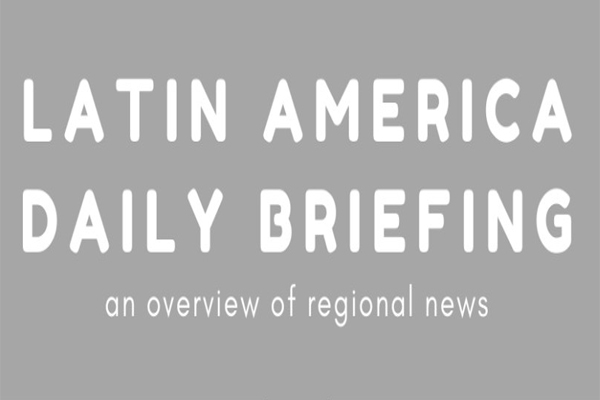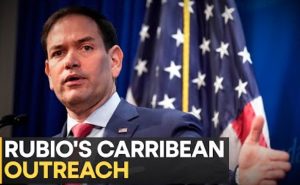
News Briefs
El Salvador
- The new penal code reform passed by El Salvador’s Legislative Assembly on Tuesday would impede news outlets from questioning the government’s narrative on issues such as security policy and the official’s secret negotiations with the gangs, reports El Faro. (See yesterday’s post.)
- It could also criminalize El Faro’s newest revelation that an anti-mafia judge documented a top MS-13 leader’s unlawful release from prison. The measure comes on the heels of the declaration of a 30-day state of exception on March 27.
In response El Faro has shut down its website for the entire day. ““The reforms to the Penal Code approved this week by the Bukele-controlled Legislative Assembly are a gag order on the press and freedom of expression, but above all else, an assault on the public’s right to be informed,” reads the online newspaper’s editorial. “What should citizens know about El Salvador’s gangs? Nothing, according to the government.”
Migration
- A new wave of Cuban migration to the U.S. is the biggest since the 1980 Mariel boat lift — but this time people seeking asylum are arriving at the Mexican border, often via Nicaragua, which dropped its visa requirement for Cubans last year. Last month, more than 32,000 Cubans were taken into U.S. custody along the Mexico border, double the number who arrived in February, reports the Washington Post. (See yesterday’s briefs.)
Amazon
- Colombian guerrilla groups have advanced into indigenous territory in Venezuela’s Amazonas state “by co-opting, corrupting, and conning its people,” reports InSight Crime. “Their presence has torn communities apart, fueled an illegal gold rush that is savaging the natural environment, and now it threatens the survival of ancient cultures that have for generations acted as custodians of one of the world’s most precious eco-systems: the Amazon rainforest.”
Brazil
- Former Brazilian President Luiz Inácio Lula da Silva said abortion should be “a question of public health to which everyone has the right,” noting that poor women die more often seeking the procedure which is prohibited in Brazil, while wealthier women secure access internationally. (EFE)
- Lula is the frontrunner in this year’s presidential elections, and he contrasted his stance to that of his opponent, incumbent President Jair Bolsonaro: “That agenda of the family, of values, is very behind the times and is being used by a man who has no morality about that,” Lula said. Members of Brazil’s extreme right lined up to harshly lambast Lula yesterday, whom they called a “communist” and an “enemy of Christian values.” (EFE)
- Brazil is getting its last wave of fertilizer from Russia before supplies plunge due to the conflict in Ukraine. The loss could potentially result in smaller harvests in Brazil and higher food costs globally, reports Bloomberg.
Peru
- The global fertilizer squeeze is imperiling rice production in Peru, where the seed is a staple for tens of millions of people, reports Bloomberg.
Argentina
- Argentina, which will also be affected by increased fertilizer costs, is poised for a sunflower bloom, as shipments of sunflower oil from Russia and Ukraine, which normally account for nearly 80% of exports, have plunged in response to the conflict, reports Bloomberg.
Venezuela
- Venezuela’s gross domestic product is poised to grow 20 percent this year as an increase in oil production fuels a dramatic rebound, according to a Credit Suisse Group forecast. (Bloomberg)
- Venezuela’s Caracas Museum of Modern Art, once a regional reference for cultural education, has fallen victim to economic collapse and authoritarianism, with Picassos stored above inundated basements and 700 sculptures by iconic artists crammed in a room to protect them against encroaching humidity. But a partial reopening could harken a modest comeback, reports the New York Times.
- A hearing in a U.S. federal court this week centered on whether Alex Saab is a Venezuelan diplomat, entitled to immunity from prosecution under U.S. law and international treaties, reports the Associated Press.
Regional Relations
- Some U.S. lawmakers have voiced concern over what they claim is mounting evidence that Mexican attorney general Alejandro Gertz Manero is assailing the nation’s independent judiciary and selectively targeting for prosecution opponents of President Andrés Manuel López Obrador, reports the Associated Press.
Honduras
- Honduran interior minister Ramón Sabillón has promised to extract criminal tentacles embedded in the state with “surgical” precision, reports AFP. Sabillón is, in fact, a former target of criminal groups, and was fired from his former job as police chief after dismantling a drug cartel in 2014 without informing then-president Juan Orlando Hernández.
Ecuador
- Ecuador’s government has blamed horrific prison massacres on drug gangs, but advocates say that official indifference also plays a role in the ongoing wave of violence, reports AFP. Despicable conditions have turned prisons into “human warehouses and centers of torture,” according to a damning report by a government commission convened to study in issue in December.
Costa Rica
- While Costa Rica has largely avoided bloody gang wars, president-elect Rodrigo Chaves will inherit a new security reality, with homegrown gang conflicts, fueled largely by the allure of rising drug trafficking profits, reports InSight Crime.
Guatemala
- Guatemalan authorities should immediately dismiss criminal proceedings against journalist Juan Luis Font, allow him to work freely without fear of reprisal, and stop using lawsuits to harass members of the press, said the Committee to Protect Journalists.
Cuba
- Cuba lifted all Covid-19 restrictions for travelers, in a bid to boost tourism to the island which desperately needs cash, reports the Miami Herald.
Colombia
- Colombia’s Supreme Court has approved the extradition of Dario Antonio Úsuga, better known as Otoniel, leader of the Gulf Clan cartel to the US, where he is wanted on drug trafficking charges. His capture in October, compared to the fall of Pablo Escobar by President Iván Duque, ended a seven-year manhunt, reports the BBC.
- Colombian vice presidential candidate Francia Márquez is a 40-year-old Black woman, environmental grassroots leader, and lawyer — her rapid rise is expanding a new political Black feminist perspective in Colombia and Latin America, reports Nacla.
- “Fruits of Hope,” a premium coffee, is grown, harvested and roasted by more than 1,000 guerrilla fighters who laid down their arms following the 2016 peace agreement with the FARC, reports the BBC.
Critter Corner
- Scientists in Chile have unearthed a rare cemetery with well-preserved bones of pterosaurs, ancient flying reptiles that roamed the Atacama desert more than 100m years ago. (Guardian)
Latin America Daily Briefing —
http://latinamericadailybriefing.blogspot.com












